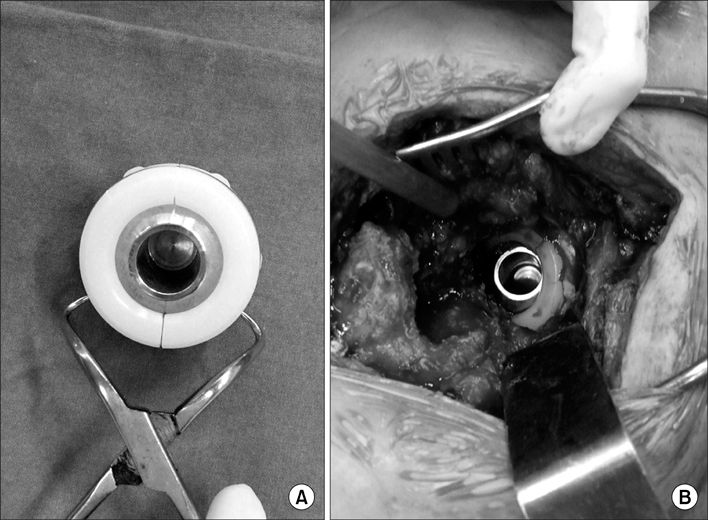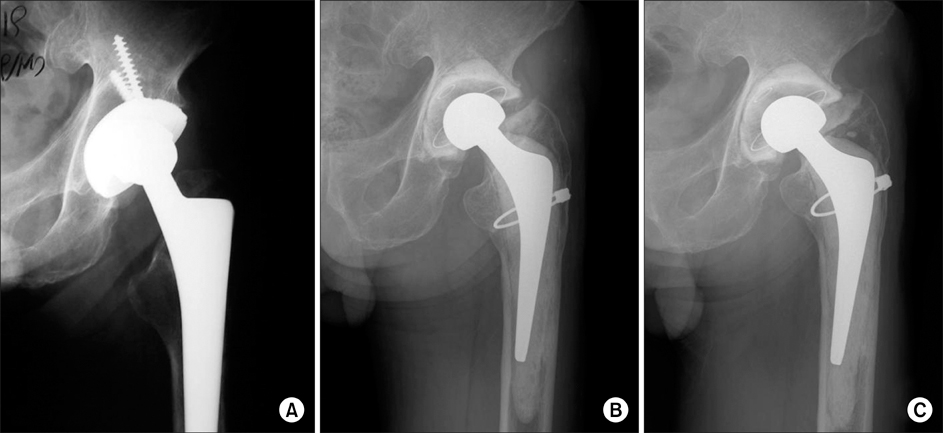J Korean Orthop Assoc.
2009 Feb;44(1):14-21. 10.4055/jkoa.2009.44.1.14.
Advantages of PROSTALAC Prepared by Modified Cement-coating Method
- Affiliations
-
- 1Department of Orthopedic Surgery, School of Medicine, Chungnam National University, Daejeon, Korea. dshwang@cnu.ac.kr
- KMID: 2186373
- DOI: http://doi.org/10.4055/jkoa.2009.44.1.14
Abstract
-
PURPOSE: To report the clinical advantage and effect of our modified cement-coating method of PROSTALAC for the treatment of infected hip arthroplasty.
MATERIALS AND METHODS
Twenty seven patients (mean age, 57), who had been treated with PROSTALAC after an infected hip arthroplasty, were enrolled in this study. Before surgery, the femoral stem was sterilized with gamma-radiation. During the operation, the stem was coated with antibiotics-impregnated cement and introduced into the femoral canal by several repeats of an insertion and removal procedure, just like a piston movement, to fit the stem into the intramedullary canal space. A bipolar hemiarthroplastic polyethylene liner was used for acetabular cup cement-fixation. A periodic hematologic test, such as ESR and CRP, the ability of early ambulation, leg length discrepancy and hip flexion, were checked for the clinical evaluation.
RESULTS
CRP was normalized by an average of 4.2 weeks after the PROSTALAC operation. Partial weight bearing was possible 2 weeks after surgery, and mean leg length discrepancy and flexion of hip was 1.4 cm and 63.5degrees, respectively. PROSTALAC was still retained in 5 cases with satisfactory function. Reinfection after final reimplantation (22 cases) was noted in 4 cases (18.2%). Neither dislocation nor periprosthetic fracture occurred after reimplantation.
CONCLUSION
The 2 phase treatment with PROSTALAC is an effective method for infected hip arthroplasty. PROSTALAC has considerable benefit for providing daily acting ability before the final reimplantation provided the appropriate surgical technique and strict sterilization of the inserted implements are combined.
MeSH Terms
Figure
Reference
-
1. Anagnostakos K, Früst O, Kelm J. Antibiotic-impregnated PMMA hip spacers: current status. Acta Orthop. 2006. 77:628–637.
Article2. Barrack RL, Harris WH. The value of aspiration of the hip joint before revision total hip arthroplasty. J Bone Joint Surg Am. 1993. 75:66–76.
Article3. Bourne RB, Hunter GA, Rorabeck CH, Macnab JJ. A six-year follow-up of infected total hip replacements managed by Girdlestone's arthroplasty. J Bone Joint Surg Br. 1984. 66:340–343.
Article4. Bucholz HW, Elson RA, Engelbrecht E, Lodenkämper H, Röttger J, Siegel A. Management of deep infection of total hip replacement. J Bone Joint Surg Br. 1981. 63:342–353.5. Clegg J. The results of the pseudoarthrosis after removal of an infected total hip prosthesis. J Bone Joint Surg Br. 1977. 59:298–301.6. Colyer RA, Capello WN. Surgical treatment of the infected hip implant. Two-stage reimplantation with a one-month inverval. Clin Orthop Relat Res. 1994. 298:75–79.7. Crockarell JR, Hanssen AD, Osmon DR, Morrey BF. Treatment of infection with debridement and retention of the components following hip arthroplasty. J Bone Joint Surg Am. 1998. 80:1306–1313.8. Deshmukh RG, Thevarajan K, Kok CS, Sivapathasundaram N, George SV. An intramedullary cement spacer in total hip arthroplasty. J Arthroplasty. 1998. 13:197–199.
Article9. Duncan CP, Beauchamp C. A temporary antibiotic-loaded joint replacement system for management of complex infections involving the hip. Orthop Clin North Am. 1993. 24:751–759.
Article10. Fizgerald RH Jr. Infected total hip arthroplasty: diagnosis and treatment. J Am Acad Orthop Surg. 1995. 3:249–262.11. Garvin KL, Hanssen AD. Infection after total hip arthroplasty. Past, present, and future. J Bone Joint Surg Am. 1995. 77:1576–1588.
Article12. Goulet JA, Pellici PM, Brause BD, Salvati EM. Prolonged suppression of infection in total hip arthroplasty. J Arthroplasty. 1988. 3:109–116.
Article13. Gustilo RB, Pasternak HS. Revision total hip arthroplasty with titanium ingrowth prosthesis and bone grafting for failed cemented femoral component loosening. Clin Orthop Relat Res. 1988. 235:111–119.
Article14. Grauer JD, Amstutz HC, O'Carroll PF, Dorey FJ. Resection arthroplasty of the hip. J Bone Joint Surg Am. 1989. 71:669–678.
Article15. Haddad FS, Masri BA, Garbuz DS, Duncan CP. The treatment of the infected hip replacement. The complex case. Clin Orthop Relat Res. 1999. 369:144–156.16. Jackson WO, Schmalzried TP. Limited role of direct exchange arthroplasty in the treatment of infected total hip replacements. Clin Orthop Relat Res. 2000. 381:101–105.
Article17. Koo KH, Yang JW, Cho SH, et al. Impregnation of vancomycin, gentamycin and cefotaxime in a cement spacer for two-stage cementless reconstruction in infected total hip arthroplasty. J Arthroplasty. 2001. 16:882–892.18. Kostuik J, Alexander D. Arthrodesis for failed arthroplasty of the hip. Clin Orthop Relat Res. 1984. 188:173–182.
Article19. Lieberman JR, Callaway GH, Salvati EA, Pellicci PM, Brause BD. Treatment of the infected total hip arthroplasty with a two-stage reimplantation protocol. Clin Orthop Relat Res. 1994. 301:205–212.
Article20. Masterson EL, Masri BA, Duncan CP. Treatment of infection at the site of total hip replacement. Instr Course Lect. 1998. 47:297–306.21. Masterson EL, Masri BA, Duncan CP, Rosenberg A, Cabanela M, Gross M. The cement mantle in femoral impaction allografting. A comparison of three systems from four centers. J Bone Joint Surg Br. 1997. 79:908–913.22. McDonald JD, Fitzgerald RH Jr, Ilstrup DM. Two-stage reconstruction of a total hip arthroplasty because of infection. J Bone Joint Surg Am. 1989. 71:828–834.
Article23. Moon KH, Kang JS, Lee TJ, Jung JH. Two-stage revision surgery of the infected hip bipolar hemiarthroplasty using the PROSTALAC. J Korean Orthop Assoc. 2005. 40:442–448.
Article24. Pagnano MW, Trousdale RT, Hanssen AD. Outcome after reinfection following reimplantation hip arthroplasty. Clin Orthop Relat Res. 1997. 338:192–204.
Article25. Petty W, Goldsmith S. Resection arthroplasty following infected total hip arthroplasty. J Bone Joint Surg Am. 1980. 62:889–896.
Article26. Ries MD, Jergensen H. An inexpensive molding method for antibiotic-impregnated cement spacers in infected total hip arthroplasty. J Arthroplasty. 1999. 14:764–765.
Article27. Scharfenberger A, Clark M, Lavoie G, O'Connor G, Masson E, Beaupre LA. Treatment of an infected total hip replacement with the PROSTALAC system. Part 1: Infection resolution. Can J Surg. 2007. 50:24–28.28. Spangehl MJ, Younger AS, Masri BA, Duncan CP. Diagnosis of infection following total hip arthroplasty. Instr Course Lect. 1998. 47:285–295.29. Takahira N, Moritoshi I, Higashi K, Uchiyama K, Miyabe M, Naruse K. Treatment outcome of two-stage revision total hip arthroplasty for infected hip arthroplasty using antibiotic-impregnated cement spacer. J Orthop Sci. 2003. 8:26–31.
Article30. Tsukayama DT, Estrada R, Gustilo RB. Infection after total hip arthroplasty. A study of the treatment of one hundred and six infections. J Bone Joint Surg Am. 1996. 78:512–523.
Article31. Ure KJ, Amstutz HC, Nasser S, Schmalzried TP. Direct exchange for the arthroplasty treatment of infection after total hip replacement. An average ten-year follow-up. J Bone Joint Surg Am. 1998. 80:961–968.32. Wentworth SJ, Masri BA, Duncan CP, Southworth CB. Hip prosthesis of antibiotic-loaded acrylic cement for the treatment of infections following total hip arthroplasty. J Bone Joint Surg Am. 2002. 84:Suppl 2. 123–128.
Article33. Wymenga AB, van Horn JR, Theeuwes A, Muytjens HL, Slooff TJ. Preoperative factors associated with septic arthritis after arthroplasty: prospective multicenter study of 362 knee and 2,651 hip operations. Acta Orthop Scand. 1992. 6:665–671.34. Younger AS, Duncan CP, Masri BA. Treatment of infection associated with segmental bone loss in the proximal part of the femur in two stages with use of an antibiotic-loaded interval prosthesis. J Bone Joint Surg Am. 1998. 80:60–69.
Article35. Younger AS, Duncan CP, Masri BA, McGraw RW. The outcome of two-stage arthroplasty using a custom-made interval spacer to treat the infected hip. J Arthroplasty. 1997. 12:615–623.
Article
- Full Text Links
- Actions
-
Cited
- CITED
-
- Close
- Share
- Similar articles
-
- Staged Reimplantation using PROSTALAC in Infected Total Hip Arthroplasty: A Case Report
- Effect of Nano-filled Protective Coating on Microhardness and Wear Resistance of Glass-ionomer Cements
- Influence of nano-structured alumina coating treatment on shear bond strength between zirconia ceramic and resin cement
- Effects of fluoride release and solubility of resin modified glass ionomer with surface coating agents
- A modified technique for extraoral cementation of implant retained restorations for preventing excess cement around the margins



